After Throwing Scientists Under the Bus for a Media Smearing, Cochrane Backtracks on Mask Review Statement
Editor Karla Soares-Weiser has still not explained her unprofessional collusion with social media influencer Zeynep Tufekci, who falsely claimed she "corrected" the Cochrane mask review.
6 minute read
Over a year after social media influencer Zeynep Tufekci pressured Cochrane Editor Karla Soares-Weiser to put out a statement that smeared researchers and undermined Cochrane’s review that found masks have little benefit in stopping the spread of viruses, Soares Weiser released a second statement on Friday that announced she would not be making changes to the mask review.
Soares-Weiser’s reversal comes after Tufekci wrote a misleading March 2023 New York Times essay that disparaged the Cochrane mask review and falsely claimed she had “corrected” it. Bouncing off Tufekci’s spurious Times essay, author Laurie Garrett posted on X that the Cochrane authors were “bozos” who had confessed to “fraud.”
“Despite the fraudulent misrepresentation of their Cochrane review of #masks & #COVID19 protection, & now confession of fraud, these bozos have undermined public faith in [masks] & biz/govt willingness to promote use,” Garrett posted on X.
CDC Director Rochelle Walensky then testified before Congress that Cochrane had “retracted” the mask review, forcing congressional staff to correct Walensky’s false testimony “as the lack of trust in public health officials is becoming an enormous problem for many reasons.”
Word of Soares-Weiser’s unprofessional actions reached the highest levels of the British government, with one MP inviting her to Parliament’s Portcullis House to explain her actions while she was in London last year for a Cochrane event. But Soares-Weiser dodged the invite and never appeared to account for her behavior before MPs.
Soares-Weiser’s reversal will likely not quell the concerns of review authors whose reputations she disparaged by putting out a misleading statement without consulting them.
“Looks like as a collective the authors have been ‘thrown under the bus’ and disparaged and smeared in the media,” wrote one scientist to Soares-Weiser, in March of 2023, after she published the statement undermining the Cochrane mask review without consulting the review authors.
“Why was Tufekci not referred to the usual Cochrane process as many of us have done to other reporters who agree to comply with the Cochrane policy and submit and provide full COI disclosures and some of us believe she indeed has pertinent [conflicts of interest].”
Prior to pressuring Cochrane, Tufekci began promoting herself as an expert on masks in early 2020, and successfully lobbied the CDC as well as the World Health Organization to alter mask guidance. In 2021, Tufekci then co-published a substandard review on masks—that did not meet Cochrane’s rigorous criteria—in which she argued for mask mandates.
“I apologize for how this transpired since when I had spoke to the NYTs reporter a couple of weeks ago, I stood by the conclusions of the review,” emailed Michael Brown, a professor of medicine at Michigan State University, who Tufekci quoted in her essay as proof that Cochrane’s review was faulty and that masks work. “There was no intention to ‘throw you or anyone under the bus’ since I would be throwing myself under the bus as the sign-off editor.”
But in her March 2023 essay, Tufekci quoted Brown disagreeing with the Cochrane review’s conclusions and promoting mask mandates. Bouncing off Brown’s quote, Tufekci then claimed that Brown’s opinion was straightforward evidence that masks work.
Brown, who led the Cochrane review’s approval process, told me that mask mandates may not be tenable now, but he has a starkly different feeling about their effects in the first year of a pandemic.
“Mask mandates, social distancing, the other shutdowns we had in terms of even restaurants and things like that — if places like New York City didn’t do that, the number of deaths would have been much higher,” he told me. “I’m very confident of that statement.”
So the evidence is relatively straightforward: Consistently wearing a mask, preferably a high-quality, well-fitting one, provides protection against the coronavirus.
Pushing back on Brown’s claims that he had not thrown them under the bus, one of the mask review authors emailed him, “Very naive to think you and [Editor Soares-Weiser] spoke to the media at NYTs (without informing us) and would trust them and that they would not immediately publish what you said, especially with this woman who is well known as a controversial writer.”
No media outlets reported on Soares-Weiser’s Friday statement and mask advocates ignored it on social media (not surprisingly, as it does not align with their personal politics). At the time Soares-Weiser released her March 2023 statement attacking the mask review authors, University of California at San Francisco professor Vinay Prasad called for her to be fired.
“If a NYTimes writer calls you about a Cochrane review, and what the lead author may have said in the media, you stay silent,” Prasad wrote. “You don’t throw them under the bus, especially when the author was factually correct. It is bad leadership.”
Below are some of the disparaging stories and social media postings spurred by Soares-Weiser March 2023 statement attacking the mask review authors.
Celine Gounder is an Editor-at-Large for KFF Health News, who falsely tweeted that the Cochrane review did not look at whether masks work. The review states quite clearly at the top: "We are uncertain whether wearing masks or N95/P2 respirators helps to slow the spread of respiratory viruses based on the studies we assessed."
Timothy Caulfield is a lawyer and professor at the University of Alberta and self-proclaimed expert on misinformation, who falsely tweeted that Cochrane had revised the review. No changes have been made. Caulfield once posted on X that natural immunity is associated with “antivaxx.”
Trish Greenhalgh is a professor at Oxford University and ardent mask promoter. Along with Raina MacIntrye, David Fisman, and Joseph Vipond, she recently published a review that found masks work. The Greenhalgh review was peer reviewed by Virginia Tech’s Lynsey Marr, who frequently collaborates with Greenhalgh.
Raina MacIntyre is a professor at UNSW Sydney and mask advocate whose 2009 research on masks was retracted, creating confusion over the use of masks. A lengthy expression of concern was amended to a 2021 study by MacIntyre that also promoted mask use.
Joe Vipond is an emergency doctor in Calgary, Alberta, and co-founder of the advocacy group, Masks4Canada. After Soares-Weiser released her March 2023 statement, Joe Vipond tweeted an article in The Star attacking the Cochrane review that quoted from … Joe Vipond. He then published a May 2023 essay in Scientific American that alleged “masks work” based on citations that did not support his claims.
David Fisman is a physician and professor of epidemiology at the University of Toronto. He is the subject of the book Fisman’s Fraud.
Retraction Watch is run by #scicomm writer Ivan Oransky, who used Tufekci’s essay as an opportunity to take a potshot at investigative reporter Maryanne Demasi. Scientists have criticized Oransky’s misrepresentations and obsession with Demasi since 2018.
Jonathan Reiner is a cardiologist and professor at George Washington University. After one of the Cochrane review authors appeared on CNN to discuss the mask controversy, Reiner retweeted Soares-Weiser’s statement at the CNN host Michael Smerconish, in an attempt to damage the scientist’s reputation.





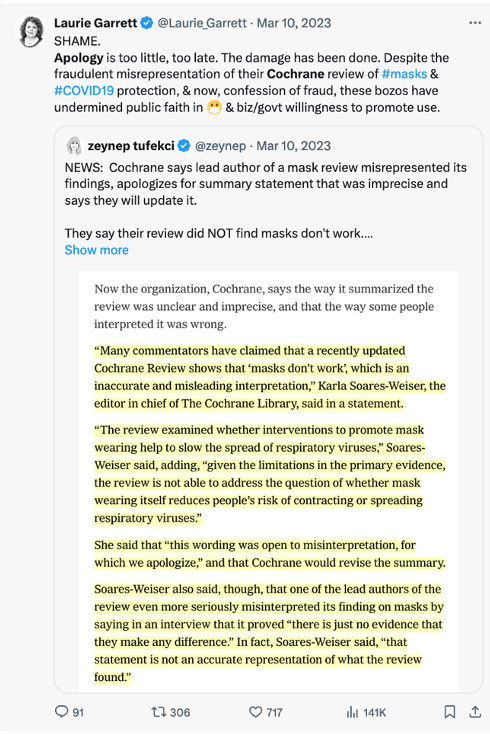
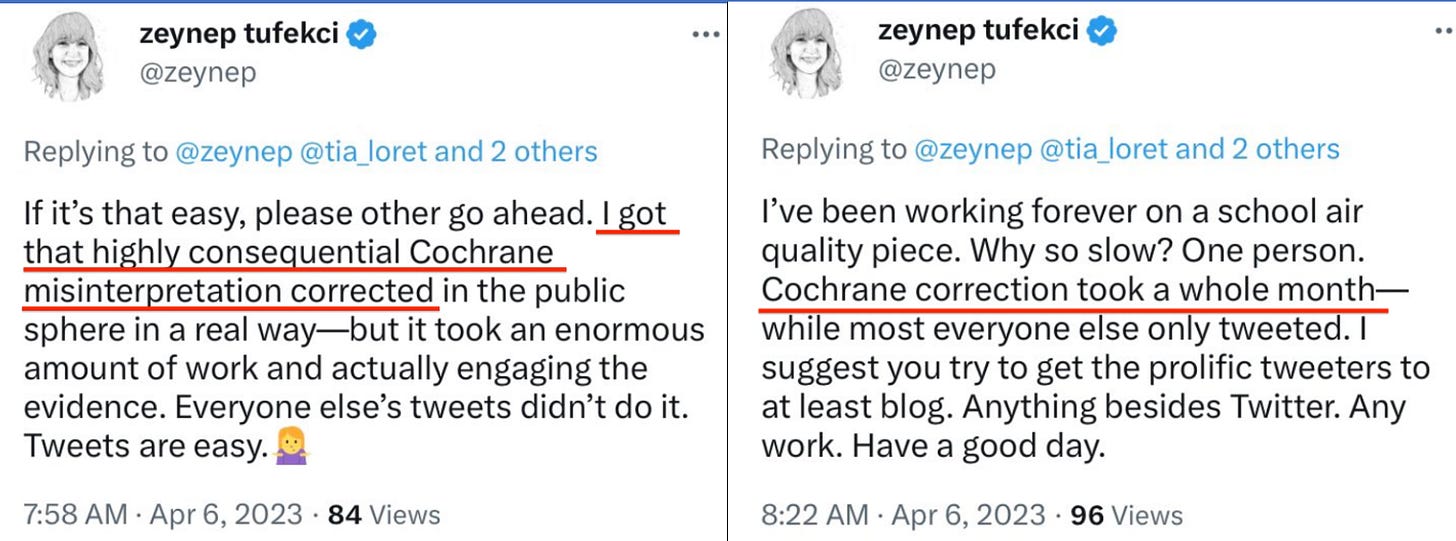
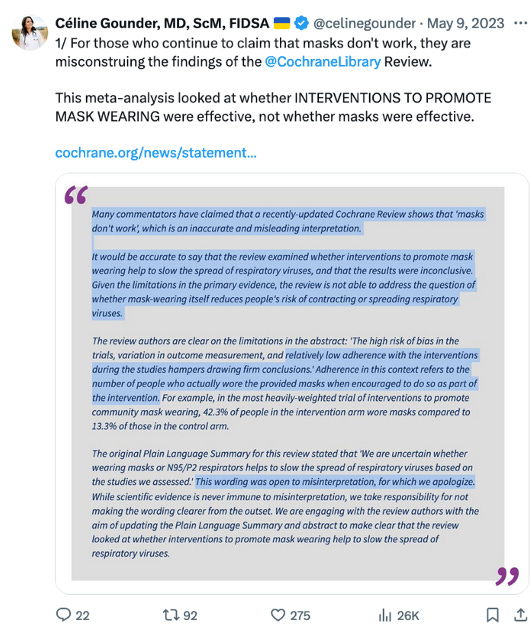
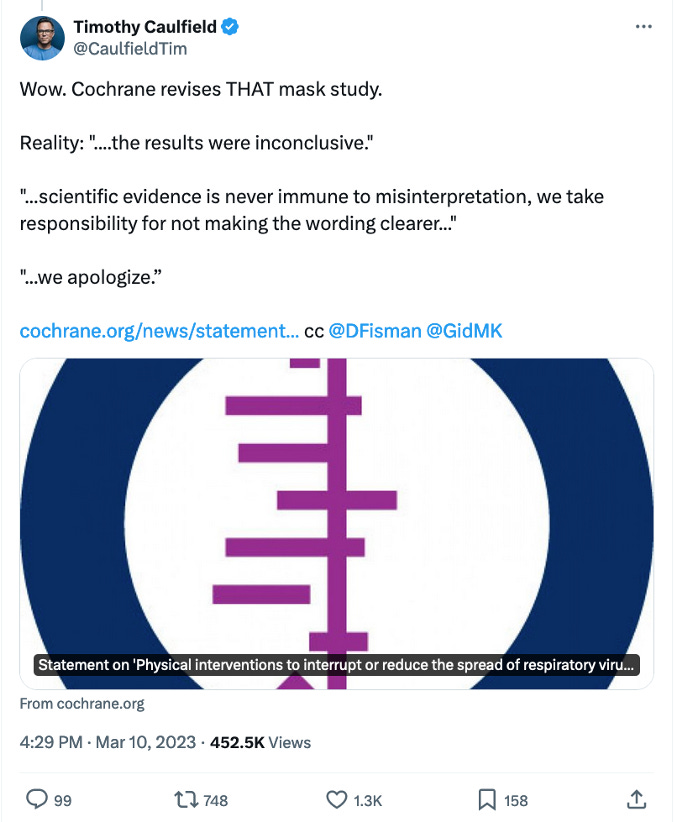

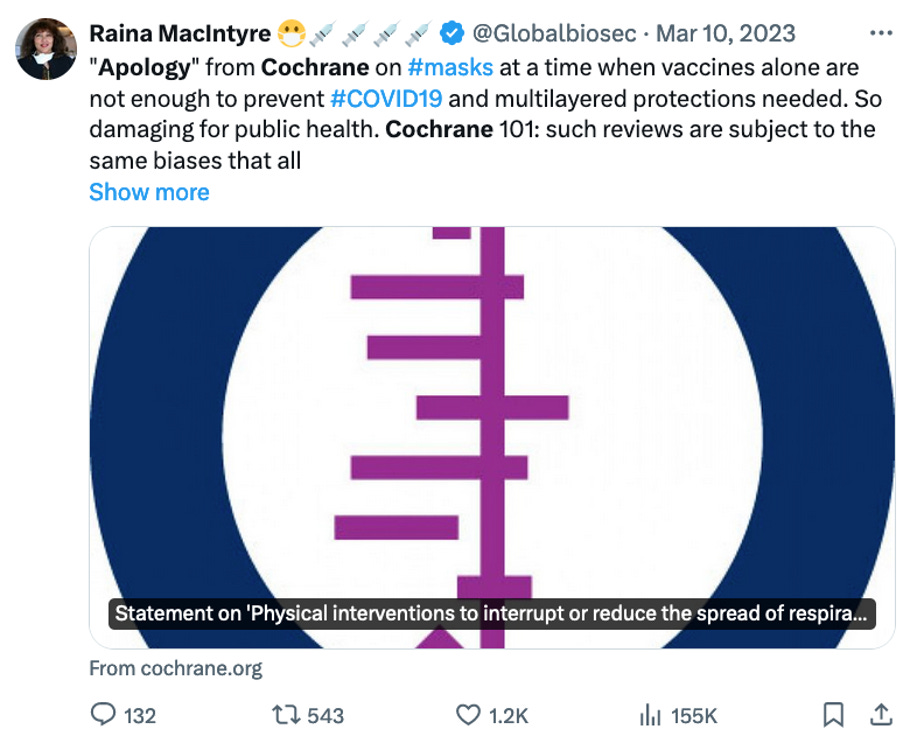
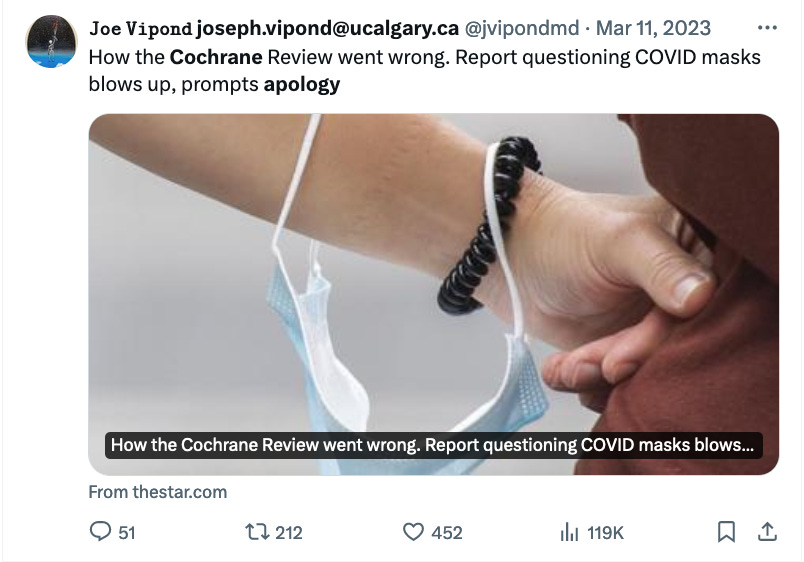
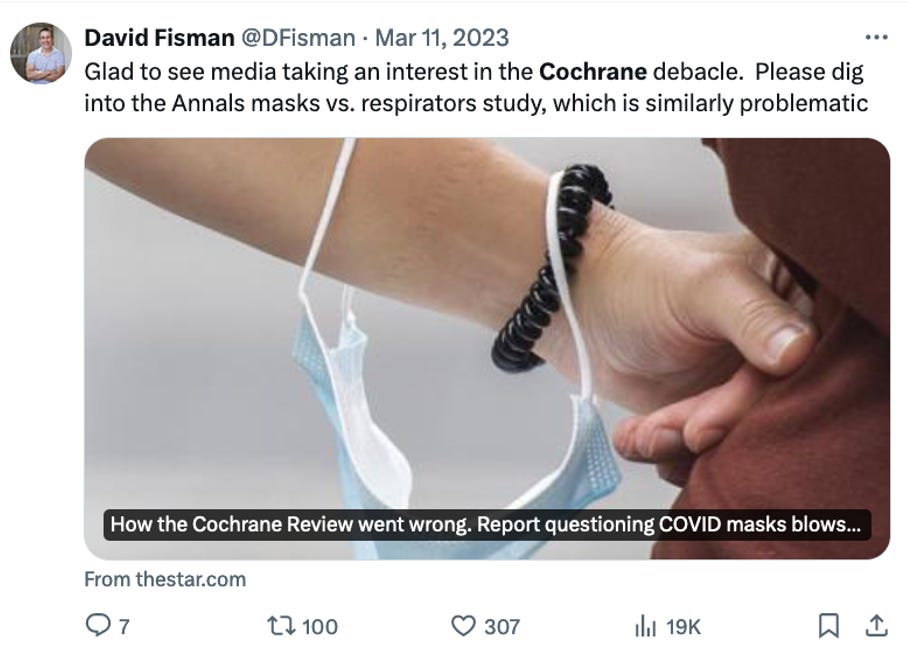
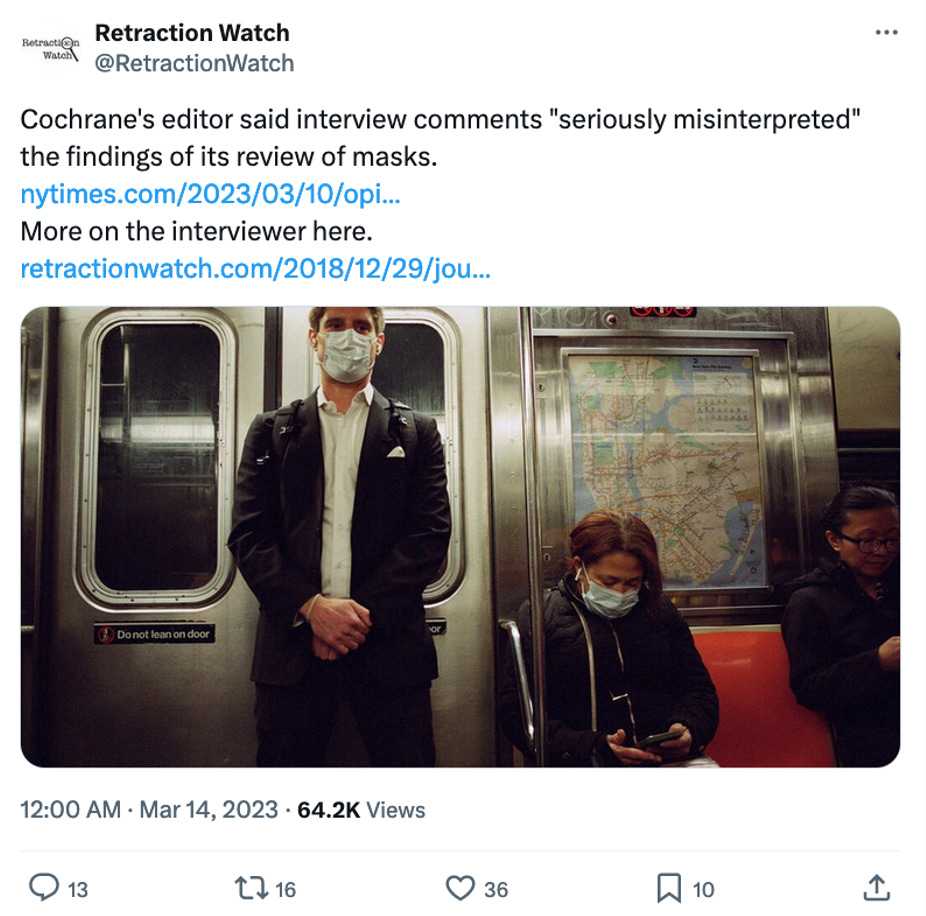
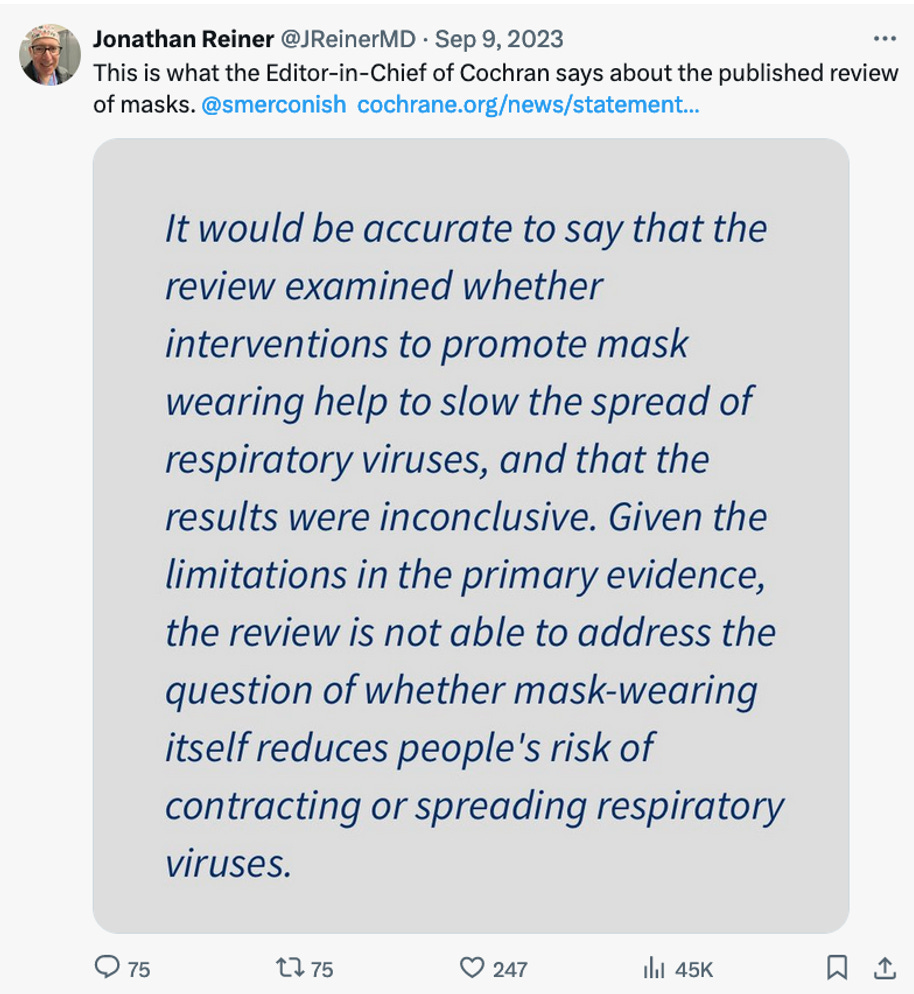
Having recovered from heart surgery a couple of years prior to Stupid 19, there was absolutely no way I was going to cover my face and reduce my intake of Oxygen. The whole fiasco made me certain that we are living in the Twilight Zone and some wicked spell has been cast on the gullible creatures known as humans. Hopefully many of them will learn to dismiss the “expert opinions” of those who used this entire thing as a way to feel better about their sorry ass lives by bulling others into submission.
The lies are running so thick and fast that I find myself incredulous that so many people could be so dishonest. Do they actually believe the drivel they propound? The worst are those who lie by calling others who tell the truth liars. If the goal is to sow the seeds of confusion, they certainly are succeeding. I am aghast at the immorality of our times. I am sure I am not the first to be. Cicero: "O tempura! O Mores!"